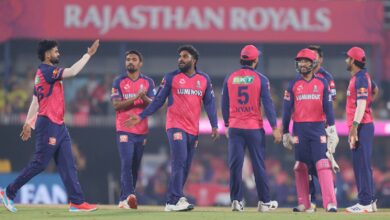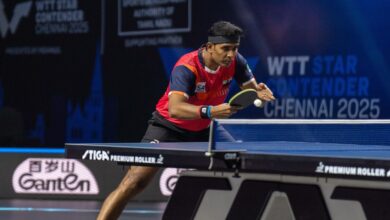In interior Odisha, a 71-year-old hockey coach sold business, mortgaged land to groom champions

“Until my last breath, until there’s life inside me, I will continue this. I will die doing this job.”
Dominic Toppo rests on the backboard of a goal post, drenched in sweat and visibly exhausted after playing quarter-court hockey on a harsh Sunday morning for close to five hours. At 71, Toppo belies his age as he weaves past players young enough to be his grandchildren. He outpaces and outmuscles them, stopping only to correct their technique.
For the last 22 years, from dawn to dusk, the Odisha resident has followed this routine: He rises before the sun, reaches the hockey field at 6.30 am, and leaves at 5.30 pm. “This sport and these players is all I have,” he says. “I have nothing else in life.”
He isn’t exaggerating. Toppo sacrificed his smooth-sailing family life, cycled 40-50 km a day at times to scout players, sold his small business and mortgaged his ancestral land so that he could continue doing what he was “born to do”: Teach young girls and boys hockey.
In the last two decades, the hockey coach who never played outside his village in Rourkela drict has produced close to 100 state-level players.
Of them, 13 have gone on to represent junior and senior national teams, including the likes of the recently retired midfielder Lilima Minz and Jiwan Kishori Toppo, who played in last year’s Junior World Cup.
Toppo is among those grassroots coaches who toil away their entire lives in anonymity, identifying and nurturing young talents, and turning them into potential India players.
Toppo sacrificed his smooth-sailing family life so that he could continue doing what he was “born to do”: Teach young girls and boys hockey. (Express photo)
“Coaches like Dominic are very essential to the sport’s ecosystem,” says Hockey India president and former India captain Dilip Tirkey. “When a young child picks up the stick for the first time, it becomes the responsibility of grassroots coaches to generate interest in them and make them strong players. At his level, Dominic has done an incredible service to the game, not least because he has produced around 13 Indian international players.”
Toppo’s hockey factory is a world away from all the pretensions of modern-day academies. Drive past the gigantic new Birsa Munda Stadium and exit Rourkela, pass the caves where Veda Vyasa is believed to have written the Mahabharata and cruise along the Brahmini on the smooth Biju Expressway for about 40 km to reach Kukuda, a village that’s quite literally Odisha’s back of beyond.
“My father used to play hockey,” Toppo says, “so I started accompanying him to the field as a child.”
It was the start of a lifelong obsession. Soon, he started playing using sticks carved out of bamboo. “I was so good that I ran from one post to another alone with the ball, beating all defenders,” he claims. But with no one to guide him, Toppo’s dream of playing big-time hockey remained just that: a dream.
“And so, I thought, ‘so what if I can’t play, I will ensure other children do not suffer the same fate as me’,” Toppo says. “At that moment, I decided to start coaching to try and produce international players. That effort is going on even today.”
Toppo didn’t immediately turn to coaching after he quit playing. He first started a ration shop, which he claims did brisk business in a village where, even today, there’s just one shop to meet all needs. It was only after he had saved enough that Toppo started coaching in 2000, on a dusty field in his village.
A self-taught coach, Toppo’s style is rustic. He picked up the finer nuances “ observing other national and international level players from head to toe”, and imbibed those methods in his coaching, sharing them with his trainees playing along with them. (Express photo)
Initially, he only enrolled children who had lost one or both of their parents. “This idea,” he says, “was inspired Mother Teresa.”Gradually, he started scouting for players across his village and other neighbouring areas. But primarily, Toppo adds, he focuses on coaching women players because “unlike boys, who do not len, girls are much more disciplined”.
A self-taught coach, Toppo’s style is rustic. He picked up the finer nuances “ observing other national and international level players from head to toe”, and imbibed those methods in his coaching, sharing them with his trainees playing along with them.
Within years, his team — Nehru Youth Club — began travelling outside the village for tournaments. But it came at a cost.
“As I focused on hockey, everything else in my life got affected. I had to shut my shop as a consequence — I was roaming here, there, everywhere. So I couldn’t do justice to the business, which was doing really well. My wife, who is no more, had been very supportive of the project, but I even sacrificed my family life. I did all this, for just one zidd (conviction) — producing international players.”
With his shop shut and no other source of income, Toppo was forced to mortgage the 12-acre farmland his family owned. “I have never taken help from anyone, and neither has anyone come forward to help me. So, I mortgaged the land to take my team outside the village for tournaments. That’s the only way they can get noticed,” he says. “I roam everywhere with my team. Delhi, Mumbai, Punjab, Haryana, Nainital, West Bengal, Benaras, Nashik…”
keeping his land as collateral, he got Rs 60,000 from the lenders. Even after more than a decade, Toppo hasn’t been able to repay the loan and consequently, couldn’t reclaim the land. Today, his only source of income are the sagwan trees (a variation of teak) he claims to have sown years ago. “I sell wood from those trees and earn around Rs 12-15,000 from it. With that money, I travel all over the country with my team.”
The income is barely enough to cover his other expenses. Toppo says there are days when he struggles to put food on his plate. “Like Saturday, I just ate some snacks for 10-20 rupees that I had. That’s it,” he says. Even the mobile phone he uses — a very basic model — was given to him a local priest.
Despite the hardships, Toppo says it’s the passion to train young kids in the hope of finding a diamond in the rough that keeps him going. “I was born to do this,” he says. “and this is what I’ll do till I die.”





